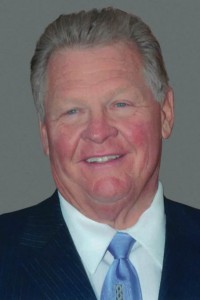The Plank Center is committed to developing the next generation of leaders and advancing the profession. It is our honor to recognize six leaders whose commitment to mentoring generates a powerhouse of influence and accelerates success in our profession.
Our question and answer series introduces the 2015 Milestones in Mentoring award recipients.
Meet Tom Hoog.
Tom Hoog is the vice chairman of Hill+Knowlton Strategies and was selected by PRWeek as one of the 100 most influential public relations practitioners of the 20th century. Spending six years in the military, Tom shares how he developed his mentoring role.
What does it mean to you to be honored with the “Milestones in Mentoring” Award?
It means a great deal. In fact, I spent the first half of my life not grasping the importance of mentoring. It was not until I was at a crossroads, facing the “why me” moment that I realized how fortunate I was, both personally and professionally, to have good mentors. At that moment, I knew it was essential to pay it forward and help others climb their ladders to success. To be honored with the “Milestones in Mentoring” Legacy Award comforts me that I made the right commitment.
When did you first realize you were a leader and a mentor?
Spending six years in the military, one learns, rather quickly, how to be a good follower. In becoming a follower, you have an opportunity to observe leaders in action. At that point, you have several choices to make: either continue to follow or make a commitment to lead.
In choosing to be a leader, one must recognize the importance of mentorship. The choice for me was at a time when I was seeking answers on how my professional journey would unfold.
After realizing the importance of mentoring, I felt compelled to share my good fortune with others. As a leader, you are tasked to create a team who will follow your guidance, offer insight and share knowledge. In return, you’re creating future leaders as well as future mentors.
Describe your role as a mentor.
I don’t think of mentoring as a role, but rather a lifestyle. Being a great mentor is about sharing the information of what you’ve learned along the way and not being apprehensive to share both the good and the bad with your mentee. Share your mistakes, so others will be conscious of the risks when making similar decisions.
One “must-have” characteristic of being a great mentor is to pay it forward. Be open to discuss all viewpoints. And, remember, it’s all right if you don’t have every answer. It’s our duty, as mentors, to provide good questions.
What is your biggest mentoring challenge?
Never be dogmatic. Lead by interpretation. Do share your vision, thoughts and mistakes. It’s up to your mentee to discover and adapt from your thoughts, questions, considerations and feedback.
What advice would you share with new mentors?
Those who chose to be mentors must recognize the commitment that goes along with that title. It’s important to understand your role. Mentoring can be a rewarding experience, but it’s crucial to be open and honest. Stay true to yourself and remember that every one has a different path to success.
What is your advice for mentees (young professionals, students, etc.)?
As a mentee, seek out individuals whom you respect and want to emulate. Ask questions, pick their brains, but also, listen and observe them. You’ve heard the saying, “talk the talk and walk the walk.” Mentees need to learn the difference and learn it early. Seek council from those individuals who succeed at it. You can learn just as much, if not more, from their actions, not just their words.
What inspires or motivates you to be a mentor?
At the end of day, knowing you made someone better just by actively listening, sharing your knowledge and knowing each other is what inspires me to mentor. You cannot begin to determine the size of the impact you can have on someone’s life, but it’s essential to invest in our profession’s future leaders. My mentors had a huge impact on my life, and I hope to have the same impact on other’s lives.
What advice did you receive from your own mentor that you will always pass along to others and why?
My football coach always encouraged his players to go for it and I’m so glad he did. Know it’s impossible to make a mistake before age 30. Learn as much as you can, make connections and do not be afraid to take risks. After age 30, your options begin to narrow.
Know the difference between a dream and a goal. Often, a dream is just a dream. However, a goal is a dream with a timeline. There’s no one right path to success, so take the one that inspires you to be your best and don’t let anything limit you to what life’s all about.
Published: September 3, 2015
More from Tom Hoog: